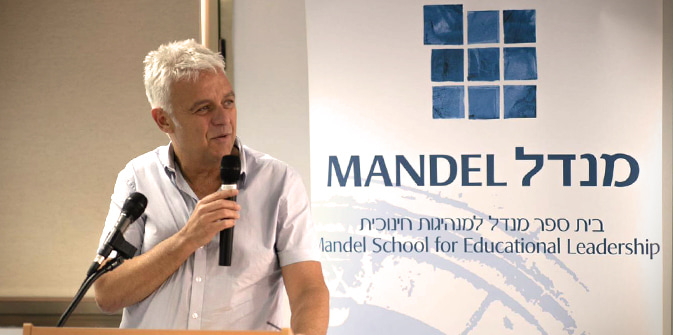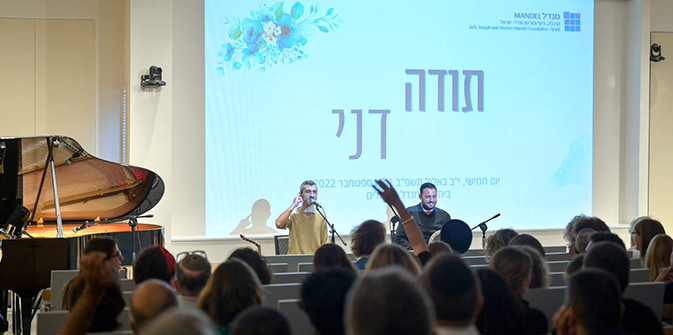
In early September, friends, colleagues, and students of Danny Bar Giora gathered at the Mandel Foundation–Israel to pay tribute to him and express their gratitude for what he has given the Mandel School of Educational Leadership and what he has given them individually, and to wish him success in the future.
Throughout the evening, fellows, graduates, faculty members, and staff of the Mandel Foundation–Israel expressed their gratitude for Danny’s inspiring leadership. Moshe Vigdor, director general of the Mandel Foundation–Israel, described Danny as “an educator, an educational leader, a teacher, an instructor, a guide, a man of vision, a man of action, a family man, and a humanist. When I look at Danny’s qualities,” he added, “I see fairness, loyalty, honesty, understanding, maturity, wisdom – wisdom of the heart and wisdom of action – as well as patience, and inclusiveness.”
Ester Dana Shauli, Danny’s personal assistant, who worked with him from his first day at the School, thanked Danny for his sensitivity as a manager and for the fact that his door was always open.
“We learned from you, as a person, about humanity and attentiveness, about the power of words and the need to be precise with them,” said Lior Journo and Reut Shalev, graduates of Cohort 30. “We learned about your smile and calmness, which influenced us all. We learned from you, as an educator, about making the person you are talking to feel that they are the entire world. We learned from you, as a manager, that it is possible to lead quietly and to resolve disagreements amicably. You instilled confidence in us; we knew that we could trust you. Beyond that, you made room for the expression and influence of all those around you.”
“In his opening remarks at the beginning of the year at the School, Professor Meir Buzaglo listed the conditions that enable the existence of ideological leadership,” they continued. “He spoke with us about independence and the ability to break away from dependence, about not seeking out recognition for action, and about the ability to be content with a small but significant change in the world. When he spoke to us, we thought about you: an ideological leader who does not give up the independence that enables him to be true to his principles, who does not expect recognition, who is not looking for fireworks, and for whom even a small change in the world is worthy, as long as it comes from within and is in the right direction. These traits enable you to be an ideological leader who influences his environment and is always involved in values clarification and constant change. Your imprint will remain within the walls of this institution, and more importantly, within the scores of graduates over the past decade…. The fact that you are embarking on a new path from a place of such stability and wholeness is an inspiration to us.”

“Danny, with his personality and style, educates us to a different state of consciousness: a state of adaptation, patience, modesty, and an avoidance of the arrogant belief that one can control people and engineer everything,” said Professor Ayman Agbaria, a faculty member of the Mandel School of Educational Leadership. “Despite his vast experience in large-scale, system-wide management of large institutions, he knows how to be non-institutional. He succeeded in not being a bureaucrat because he perfected a method of slowing time down as a way of a life, and not as a means of control,” Agbaria continued. “I once wrote to you that you were our leader, without grandiose ideas or plans and without feigned caring. You were our leader. With the inspiration, calm, inclusiveness, openness, and commitment that you created for us and instilled in us in the School, you were our leader. We are bidding you farewell this evening, and we are happy for you that you are embarking on a new path,” Agbaria said.
“When things are stormy and unstable, people search for safe ground on which to rest their feet and their souls,” Danny responded from the podium. “The first thing that I want to say to you is: be an island unto yourselves. Be an island for yourselves so that you can be an island for others. Devote time to self-care. This has always been important, and today more than ever. My second point is related to education: The best way to be prepared for storms is to deepen roots and strengthen foundations. Go back to the big questions, to the depths, to the meaning of our existence, to the great traditions, and to questions of identity. I hope for all of us that movements such as The Spirit of Man in Education and Slow Education will set the tone and mark the path for the educational system in the coming years.
“The years in which I was the director of the Mandel School for Educational Leadership were very meaningful for me,” he continued. “Ever since I left my position as a high-school principal, in every staff position that I held, I saw the world of education through conference rooms and computer screens. I paid a heavy personal price. Returning to Mandel was an exciting and fascinating return to human encounters and unmediated contact with the fellows. I directed the school for a decade, and accompanied some two hundred fellows. It seems to me that I had an influence on at least some of them, and succeeded in touching their souls, and maybe even contributed a bit to their work in the world.”
At the end of the evening, Danny thanked those who had worked alongside him during the years that he directed the School: the faculty members, the fellows, the staff, and Ester Dana Shauli and Maya Barak, who supported him in his work. “I thank the director general of the Foundation and the president and CEO Jehuda Reinharz. A final word of thanks is given to Mort Mandel, of blessed memory, for the great privilege of working with him. Mort was an inspiring man. I learned a great deal from him about generosity, professionalism, and how important it is to dream big.”
The entire Mandel community hopes that Danny will continue in his work — both as an educator and as a humanist.
